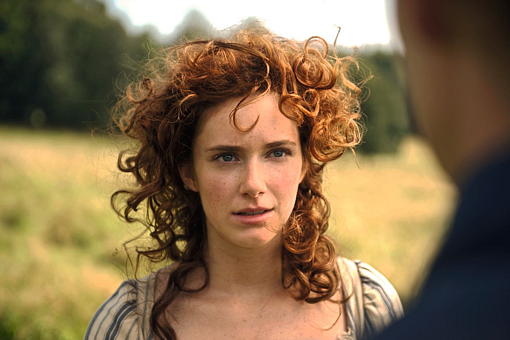By Meredith Alloway · November 7, 2011

If you’re going to do a period romance piece, and decide “young” is the only word needed to differentiate you from another famous film about another famous writer…the characters better be ridiculously fascinating and the story damn good. Goethe possesses neither. It’s lazy, predictable and the charming actors are the only thing that keeps it from falling flat on its’ face.
The story focuses on the period of Johannes’ Goethe’s life when he wrote his celebrated The Sorrows of Young Werther. In 1772 Frankfurt, 23 year old Goethe (Alexander Fehling) fails his law exam and is sent to the seemingly dull provincial court. His father doesn’t approve of his literary aspirations and hopes his son will learn discipline in his new position. One night Goethe’s new friend Wilhem (Volker Bruch) takes him to a party where he meets the delicate but feisty Lotte (Miriam Stein). They instantly like each other. After a surprisingly easy and cliché journey to love, frolicking across fields, reciting poetry and kissing in the rain, they’re soon after torn apart. You guessed it; Lotte’s engaged to a wealthier, more promising man who promises her entire family a secure future. Turns out this prince charming is also Goethe’s boss at court; ay there’s the rub. Conflict ensues, hearts break, and Goethe’s tear-drenched manuscript is born.
It’s all too easy. The Sorrows of Young Werther was a piece of literature that led to the first examples of “copy cat” suicide. It’s not a light read. And yet the film makes light of it. The character’s move about with little weight and the events in their lives that should prove devastating just seem trivial. Romeo and Juliet may be about adolescent crushes, but what makes it tragic and timeless is that we are forced into the shoes of the characters and therefore feel their wounds as if they were our own.
When the film was over, I looked at my phone and thought, “Already? Period pieces are never under two hours!” They often need the time not only to introduce us to the world, but how society operates within it. Goethe shouldn’t have been afraid to take that time. The romance happens so quickly, that we’re distracted by disbelief. If this is a love, as the film suggests, that causes its protagonist to consider suicide, the audience better understand its importance. Characters fall for each other quickly all the time in cinema, and viewers are constantly asked to take the leap of faith, but this one is forced and throws off the entire film. I never thought I’d say it, but more exposition!
Once the film dives into the conflict between Lotte’s fiancé and Goethe, it flies with the help of its’ emotionally available young cast. Fehling and Stein are undeniably enchanting, capturing the topsy-turvy emotions that accompany affection. Fehling’s strangely handsome face, centered by a crookedly handsome nose, brings both humor and melancholy to Goethe. What he lacks though is the ferocious intelligence that fueled the legendary poet through the rest of his career. He plays the young Goethe with charm, but the boy isn’t a believable predecessor to the man.
The screenwriters should have taken a cue from Goethe himself: risks. It was clear they wanted to appeal to the Jane Austen/Rom-Com crowd, but in doing so, they sacrificed their story. They settled for clichés rather than originalities. The twists and turns came right on cue, allowing you to sleepwalk your way through. The charm of their main actors was wasted on stereotypical dialogue and situations. Goethe will most assuredly have a following, but it will come and it will go as easily as its characters did throughout their romance.